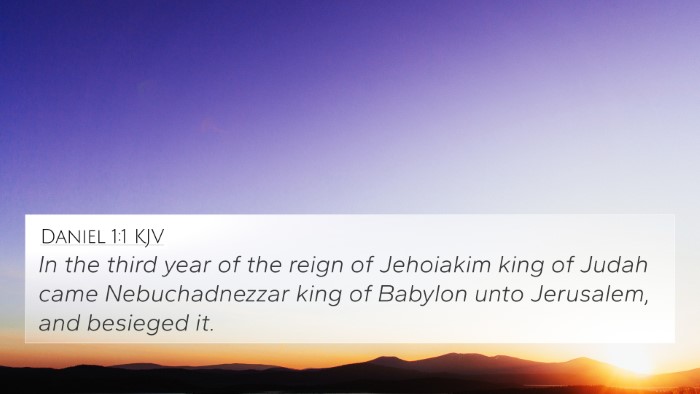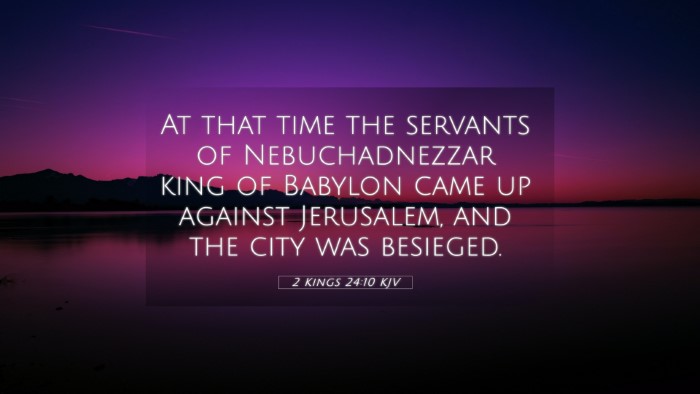Old Testament
Genesis Exodus Leviticus Numbers Deuteronomy Joshua Judges Ruth 1 Samuel 2 Samuel 1 Kings 2 Kings 1 Chronicles 2 Chronicles Ezra Nehemiah Esther Job Psalms Proverbs Ecclesiastes Song of Solomon Isaiah Jeremiah Lamentations Ezekiel Daniel Hosea Joel Amos Obadiah Jonah Micah Nahum Habakkuk Zephaniah Haggai Zechariah Malachi2 Kings 24:10 Similar Verses
2 Kings 24:10 Cross References
At that time the servants of Nebuchadnezzar king of Babylon came up against Jerusalem, and the city was besieged.
Uncover the Rich Themes and Topics of This Bible Verse
Listed below are the Bible themes associated with 2 Kings 24:10. We invite you to explore each theme to gain deeper insights into the Scriptures.
2 Kings 24:10 Cross Reference Verses
This section features a detailed cross-reference designed to enrich your understanding of the Scriptures. Below, you will find carefully selected verses that echo the themes and teachings related to 2 Kings 24:10 KJV. Click on any image to explore detailed analyses of related Bible verses and uncover deeper theological insights.

Daniel 1:1 (KJV) »
In the third year of the reign of Jehoiakim king of Judah came Nebuchadnezzar king of Babylon unto Jerusalem, and besieged it.
2 Kings 24:10 Verse Analysis and Similar Verses
Understanding 2 Kings 24:10
Bible Verse: 2 Kings 24:10 - "At that time the servants of Nebuchadnezzar king of Babylon came up against Jerusalem, and the city was besieged."
Verse Analysis and Interpretation
This verse marks a critical moment in the history of Jerusalem and the Kingdom of Judah. The prophecy concerning the fall of Jerusalem, as foretold by earlier prophets, begins to unfold here. It speaks to the culmination of a series of events predicated by disobedience to God's covenant.
The verse indicates not just a physical siege but also symbolizes the spiritual desolation of Israel. According to the commentaries, this siege represents God's judgment against a nation that had turned from Him. The prophetic warnings from Jeremiah and others are now coming to fruition, demonstrating the seriousness of Judah's sin and rebellion.
Thematic Connections and Cross-References
The siege of Jerusalem in 2 Kings 24:10 can be understood more richly through connections with other biblical texts. Below are significant cross-references that relate to this event:
- Jeremiah 25:8-9: A prophecy concerning the Babylonian invasion and God's judgment.
- 2 Chronicles 36:15-16: Highlights God's patience and the rebellious attitude of the people.
- Isaiah 39:6-7: Predicts the fall of Jerusalem as a result of trust in foreign alliances.
- Habakkuk 1:6: God raises up the Chaldeans as an instrument of judgment.
- Lamentations 1:1: A reflection on the desolation of Jerusalem after the siege.
- Ezekiel 24:2: Denotes the significance of Jerusalem’s fall in the eyes of prophets.
- Daniel 1:1-2: Discusses the exile that follows the siege of Jerusalem.
- Micah 3:12: A prophetic warning about the consequences for Jerusalem's sins.
- Matthew 22:7: Jesus references the king's destruction of the city in relation to rejection of Him.
- Luke 21:20: Jesus prophesies the coming siege of Jerusalem.
Insights from Commentaries
Matthew Henry: This commentary emphasizes that this siege was not only a national tragedy but also a spiritual failure. Henry reminds us that the people had forsaken the Lord and thus were subject to His divine discipline. The event showcases God’s sovereignty even amidst calamity.
Albert Barnes: Barnes points out the historical context of Nebuchadnezzar's power and influence, asserting that God was using Babylon as His agent for judgment. He underscores the providence of God in directing these events and the necessity of understanding God’s purposes in human history.
Adam Clarke: Clarke's analysis includes a focus on the implications of the siege for the Jewish society at that time, noting the psychological and spiritual ramifications of their disobedience. He recognizes the symbolic nature of the siege as a representation of God's abandonment of His people in response to their idolatry.
Connecting Themes in Scripture
This event presents a profound narrative woven throughout the Biblical canon. The connections between the verses provide insights into the nature of God’s justice, mercy, and the consequences of sin. Understanding these connections can enrich one's Bible study and personal reflection.
How to Use Cross-References in Bible Study
Engaging with cross-references enhances Biblical study methods significantly. Below are some tools and methods for practical application:
- Bible Concordance: Use a concordance to find related verses based on keywords.
- Cross-Reference Guides: Utilize guides that provide thematic links between scriptures.
- Topical Studies: Identify themes (e.g., judgment, mercy, faith) and trace their development through the Bible.
- Group Studies: Discuss and compare verses in Bible study groups to understand different perspectives.
- Prayer and Meditation: Reflect on the interconnectedness of verses through prayerful consideration.
The Importance of Inter-Biblical Dialogue
The interaction of verses across the Old and New Testaments illustrates a coherent narrative of God’s plan for redemption. Engaging with these connections deepens understanding, enriches faith, and aids in sermon preparation.
In summary, 2 Kings 24:10 serves as a pivotal moment that emphasizes God's judgments against a wayward people. By exploring the related verses and understanding their implications, we gain insights into the serious nature of spiritual disobedience and the hope that remains in God's promises and faithfulness.
Conclusion
Engaging with the Bible through cross-references creates a robust framework for understanding. 2 Kings 24:10 opens the door for comprehensive analysis, presenting an opportunity to reflect on God's character and our responses to Him. By employing cross-referencing tools and methods, believers can deepen their spiritual insight and biblical literacy.



